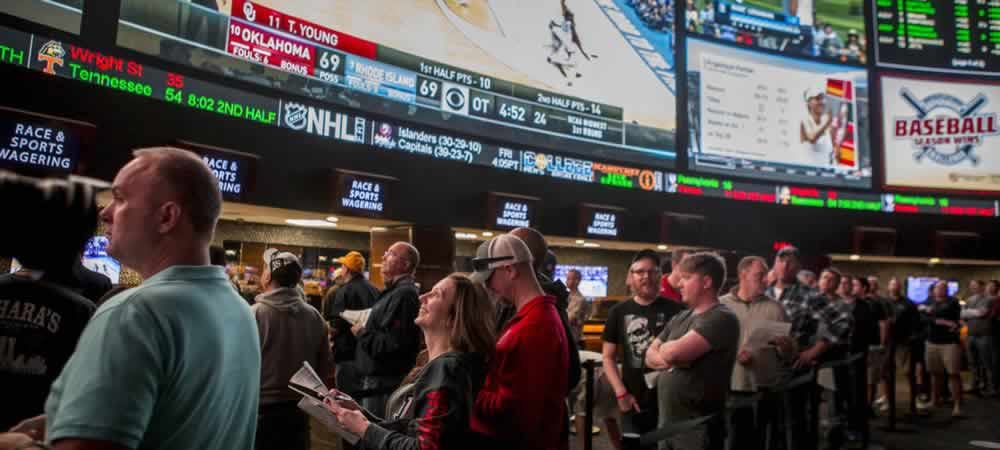- A group of former Republican politicians is suing the state and asking for a preliminary injunction against all sports betting.
- Current RI representatives claim that sports wagering was authorized by voter referendum in 2016.
PROVIDENCE, R.I. – Rhode Island might be wine country, but opponents of the recently passed sports legalization bill are all sour grapes.
Just yesterday, a Republican consortium of failed politicians and political also-rans filed a lawsuit against the state to bar sports wagering. The suit also seeks a preliminary injunction against the new gambling products statewide.
House Bill 5241 was passed and signed into law late last year, legalizing sports wagering at both Rhode Island casino venues (Twin River Casino Lincoln and Twin River Casino Tiverton).
In March, Senate Bill 37 was passed into law, authorizing the state to host sports wagering services over the Internet (though this latter service has not yet rolled out).
Proponents of the suit include Daniel Harrop, a former 3-time Providence mayoral candidate and “quirky psychiatrist”, as well as lawyer Brandon Bell, former chair of the Republican Party of Rhode Island and a failed House candidate.
The argument is that expanded gambling in Rhode Island requires voter approval. Thus, claims the suit, the current sports wagering industry in the state is operating unconstitutionally.
Attorney Joseph Larisa, representing the plaintiffs, explains the rationale for suing the state of Rhode Island to stop sports betting.
“It’s not a Republican issue, it’s not a Democrat issue, it’s a good government issue. If one provision of our constitution is, ‘Eh, we’ll just disregard it this time,’ then all provisions of our constitution are in jeopardy.”
The 2016 Rhode Island Gambling Referendum
Rhode Island Senate President Dominick Ruggerio disagrees, claiming that sports betting was implicitly approved when state residents voted in 2016 to authorize table games at the Twin River Casino.
Ruggerio does not foresee a “monkey wrench” being tossed into the workings of Rhode Island sports betting.
“I thought we were on solid legal ground, [and] I think we still are. I’m confident that we will prevail in this…and to me, it’s just delaying tactics on the part of [Rhode Island] Republicans.”
Ruggerio’s assertion is backed up by the text of the approved 2016 referendum, particularly in the way it defines “casino gaming.” Section 42-61.2-1(8) has the operative language:
“‘Casino gaming’ means any and all table and casino-style games played with cards, dice, or equipment, for money, credit, or any representative of value; including, but not limited to, roulette, blackjack, big six, craps, poker, baccarat, paigow, any banking or percentage game, or any other game of device included within the definition of Class III gaming as that term is defined in Section 2703(8) of Title 25 of the United States Code…”
Sports betting may or may not be considered a traditional casino game (as is being challenged in several other states), but it is unambiguously a part of Class III gaming per the cited Indian Gaming Regulatory Act.
Further, sports betting is unambiguously a “casino-style game” (as it is commonly but not exclusively offered in casinos) played with “equipment” (odds boards, self-serve kiosks, ticket printers, etc.) “for money, credit, or any representative of value.”
Is There Public Support For The Proposed Sports Betting Ban?
While the voters approved table games and casino expansion in 2016, the ballot measure passed by 10 points, with 234,327 yeas (54.95%) against 192,107 nays (45.05%).
That’s a strong margin, but it’s not a blowout. It is conceivable – if unlikely – that resident sentiment has soured on gambling and sports betting in the years since expanded gambling was approved.
Quoted by local news affiliate ABC6, Warwick resident Dan DiCicco is in favor of the current sports betting law. “I support it, and I’m not against Rhode Island doing it,” he said. “Because you know what? Rhode Island can profit from it.”
Meanwhile, resident Marisa Siino of Providence thinks legal sports betting should be up to the people.
“I think it’s necessary to hear what people have to say. If people think it’s unlawful to bet on sports then they should definitely speak up.”
This, of course, sidesteps the fact that people of Rhode Island have already had their say. Expanded gambling was approved by the people in 2016, and sports wagering in Rhode Island is not compulsory. One may participate if one wishes to. So, too, may one abstain.
Further, the activity has proved popular, with the state’s limited venues still managing to see a 2019 betting handle of $63.3 million (through March), generating state revenue of nearly $820,000 so far.
Hopefully, common sense and legal precedent will win out in Rhode Island. Otherwise, area bettors may not be able to wager locally this fall on the NFL’s Patriots and what promises to be one of Tom Terrific’s last go-rounds.
Advertising Disclosure
In order to provide you with the best independent sports betting news and content LegalSportsBetting.com may receive a commission from partners when you make a purchase through a link on our site.
News tags: Rhode Island | RI HB 5241 | RI SB 37 | sports betting

Andy has been writing professionally for nearly two decades, with the last three years being dedicated to his primary passions: sports wagering news and gambling industry analyses. A walk-on punter, Andy has a particular interest in professional football, baseball, and horse racing betting. Come early May, you can always catch Andy – clad in all white, mint julep in hand – on Millionaires Row at Churchill Downs. In his dreams.


 College Football Betting
College Football Betting Best Online Sports Betting
Best Online Sports Betting Best Legal NFL Betting
Best Legal NFL Betting States With Legal Sports Betting
States With Legal Sports Betting Sports Betting Events
Sports Betting Events




